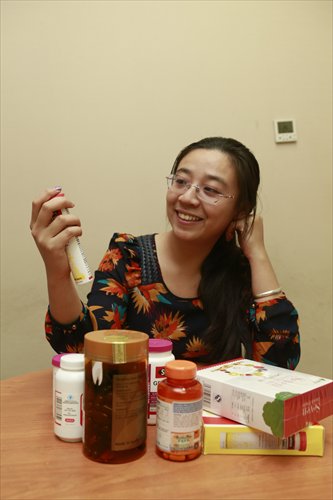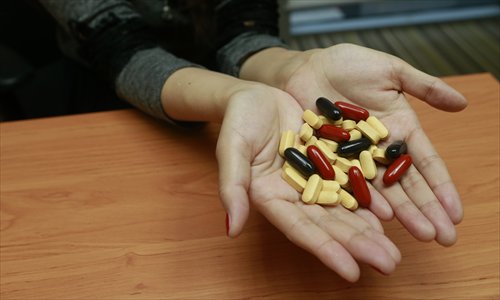Bottled health!
Young Chinese increasingly obsessed with wellness products

More and more young Chinese people are turning to health products to improve their health. Photo: Li Hao/GT
It is 11:55 pm on December 11 and Zhang Dan, 29, is sitting at her computer, eyes glued to the screen. Every 10 seconds, she refreshes the page, patiently waiting for the stroke of midnight when "Double 12," a Chinese retail holiday, similar to Cyber Monday in the US, where Chinese companies on taobao.com and jd.com offer huge discounts online, will begin. There are several items in her online shopping cart, but, unlike Cyber Monday shoppers in the US, Zhang isn't buying clothes, electronics or even cosmetics; her cart is full of health products.
"I think after 25, women should begin taking health products to help maintain good health, and men should start no later than 30," said Zhang.
The clock struck midnight and Zhang quickly clicked "pay all." She purchased three big bottles of collagen liquid, two bottles of chlorophyll liquid, one pot of propolis and several bottles of vitamin pills from a shop selling imported Australian health products. She also bought enzymes and barley tea from another shop that sells imported Japanese health products.
According to a December 8 market report jointly released by taobao.com, the largest shopping website in China, and CBNData, the data analysis arm of China Business Network, the younger generation of Chinese are spending more money on health products.
The report, which is based on taobao.com's shopping figures from 2011 to 2014, found that China's young people start to buy health products at 22 and that over 60 percent of the health products sold during the period were purchased by people aged between 22 and 50. Female buyers account for some of the youngest shoppers and spend more money than men.
Shi Jie, a Beijing-based nutritionist, told Metropolitan that one of the most common consultations she has is with people asking about health products. She gets these kinds of consultations every day and the average age of the people who come to her is getting younger and younger.
She attributes this phenomenon to the young people in urban areas, especially those in large cities like Beijing and Shanghai, who increasingly like to buy health products.
"They face more pressure from life and work, and their unhealthy living habits make them feel ill," Shi said.

Experts say people should consult a doctor before taking health products as misuse may lead to organ damage or poisoning. Photo: Li Hao/GT
What do Chinese young people buy?
According to a report published by Forbes magazine on July 19, the top five favorite health products in China are protein powder, calcium supplements, laxatives, vitamin E and weight loss products. The information came from the latest national audit of China's health sector by IMS Health, an international company that focuses on data analysis in the health industry.
China's health product industry grew by an average of 10 to 15 percent annually between 2010 to 2014 and the total sales volume has rocketed from 260 billion yuan ($40.14 billion) to 400 billion yuan in the last five years, according to the China Health Care Association's website.
Xia Xiaoci, a 20-year-old university student studying in Australia, runs a WeChat online store where she sells mainly Australian health products she buys from the local pharmacy and supermarket. In 2014, she mailed over 3,000 parcels to China from Australia, and over 90 percent of them contained health products.
"My customers are all my peers, and the oldest is just 35," said Xia.
She started her business when she went to Australia to attend university two years ago. She began by selling health products among her WeChat friends, young people aged between 18 to 23. At first, she mainly sold health products for women, like grape seed pills and cranberry capsules, but now her shop sells almost every kind of health product one can find in Australia like liver-protecting tablets, vitamin pills, and weight loss products.
"I did not expect my business would be so good, after all, my customers are so young. I even thought about asking my parents to introduce the products to their friends, but soon I found it was not necessary," said Xia.
"My stored products were soon sold out and from then until now the number of my customers has risen from about 20 to over 400, and every month I have to drive a car to several nearby towns to buy all the things on my customers' lists, which surprised me."
Xia said she is planning to open an online shop on taobao.com and hire one or two classmates to help her with the increasingly large demand for Australian health products in China.
What do foreigners buy?
According to a report on China's online shopping released by US-based market research and analysis company, Nielsen, in October, high-income and well-educated young people aged between 26 and 35 are more like to shop on foreign websites, and their favorite goods are clothes, cosmetics, and health products.
Wang Fan, 32, is one of them. He buys protein powder and vitamin pills directly from the US on Amazon. For him, only imported health products are safe. "China is having heavy pollution in the air, water, and soil now, and I am afraid that the products are also polluted," said Wang. "Not to mention not good for your health, they may cause diseases."
As a result, Wang insists on buying health products from overseas, especially from the US.
However, people overseas may not be as crazy about buying health products as the Chinese. According to the website of the American Association for Cancer Research, the most favored health product in the US is vitamin C, and 17 percent of Americans take it daily. Vitamin E follows, with about 16 percent of Americans taking it daily, and the third is allicin, which is taken by 8.7 percent of the population.
Shi said compared with Chinese, the reason Westerners take health products is much more simple. "It's just a dietary supplement," said Shi. "The Western diet is different from what we have in China, and they often lack vegetable and fruits, so they take pills to supply the vitamins and other necessary elements."
In China, many young people living in urban places turn to health products to get a stronger body, higher immunity, smoother skin, and more hair, said Shi. "With all the bad living habits such as sleeping late, irregular eating, sedentariness and less physical exercise, it will be hard for them to achieve their goal."
Do supplements make a difference?
Zhang said the effects of the health products are "quite vague."
"I usually refuse those with chemical elements, and only buy those one hundred percent natural health products," said Zhang. "I think that is safer, and I have found my skin a little bit smoother than years ago."
Wang also cannot give any specific or obvious effects of the health products he uses but maintains that he thinks taking health supplements is useful.
"I have not been fallen ill for years, not even catching a minor cold," said Wang. "Maybe remaining healthy and not falling ill are the effects of the health products."
Shi said there's no health product that offers immediate results, and they are not medicine, so people should not rely on health products to cure certain diseases. When they find something wrong with their health, such as sleeplessness and serious hair loss, they should go to the hospital to consult a doctor instead of blindly taking health products.
She said the nutrition elements in daily foods such as fish, eggs, dairy products, meat, vegetables and fruits are enough to supply the human body's demand for nutrition, especially for young people who have an active metabolism, so it is not very good for young people to start taking health products too early.
"Young people should go to a professional nutritionist or doctor for a customized nutrition plan," said Shi. "Some health products may harm people's health, for example, too much protein may harm the kidney, and an overdose of vitamins can cause poisoning."
Shi also stressed the importance of a balanced diet. "How can a pill be richer in nutrition than a meal made of natural foods, which contain thousands of kinds of nutrition elements?" she asked.